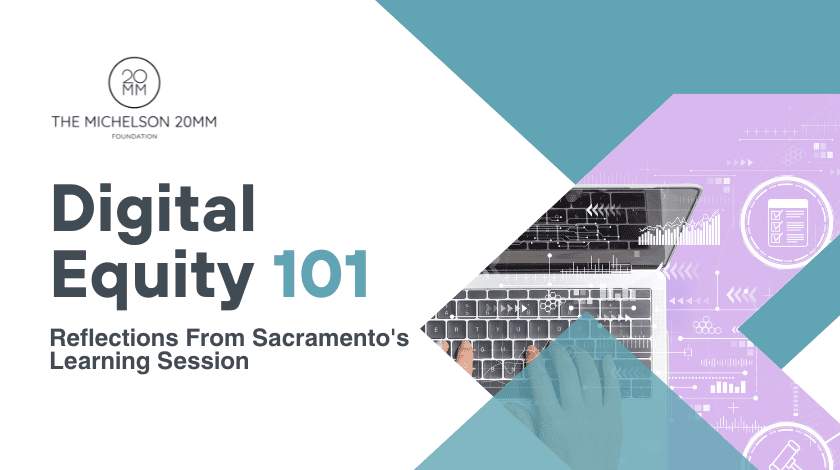By Cristal Mojica
Access to broadband is a fundamental right in the twenty-first century. Without a reliable, high speed internet connection, California’s historically marginalized communities will continue to be systemically held back from fully participating in our digital society. The daily impacts in terms of accessing and participating in education, health care, public benefit programs, and more, as well as opportunities to prioritize closing the digital divide were the themes of a recent Digital Equity 101 learning session in Sacramento, held in partnership with the Michelson Center for Public Policy.
On April 12th, I had the pleasure of joining Arnold Sowell, Executive Director, NextGen Policy and Natalie Gonzalez, Deputy Director of the Digital Equity Initiative, California Community Foundation as we shared the current policy landscape, technology challenges, and ways to advance access, affordability, and adoption throughout the state with legislative staff members.
The Digital Equity Landscape
Despite the increase in internet usage over the past decade, prices for internet services continue to rise in California, leaving hundreds of thousands of Californians without access. In fact, more than 1:2 Californians without internet do not have it due to cost. In addition to affordability challenges, California is in dire need of accurate broadband infrastructure mapping due to the fact that existing maps paint an inaccurate picture of connectivity throughout the state.
Top Priorities
With an eye towards securing accessible, reliable internet for all, the digital equity advocates recommended these priorities for California’s legislative teams to consider:
- Ongoing Regulatory Engagement
- Internet Affordability
- Equitable Mapping and Infrastructure Access
Opportunities to Advance the Fundamental Right
Following the discussion on priorities, Sowell and Gonzalez shared expertise on the history of California’s DIVCA (Digital Infrastructure and Video Competition Act of 2006) legislation, aimed at addressing the digital divide—as well as current opportunities to improve access, affordability, and adoption. Underscoring the widespread discrimination in internet services, Gonzalez detailed how digital redlining continues to plague our state, manifesting itself through pricing disparities and historic underinvestments in communities.
Both Sowell’s and Gonzalez’s organizations have been actively calling on the California Public Utilities Commission (CPUC) to reconsider their broadband funding priority areas, which glaringly omitted Los Angeles’ most vulnerable communities. In Sacramento, they discussed the need to revise the maps and gather new metrics to ensure the federal funding is used effectively.
Together with our partners, we look forward to continuing to advance digital equity in California as we work towards a future where every Californian has reliable access to high speed internet.
Michelson 20MM is a private, nonprofit foundation seeking to accelerate progress towards a more just world through grantmaking, operating programs, and impact investing. Co-chaired and funded by Alya and Gary Michelson, Michelson 20MM is part of the Michelson Philanthropies network of foundations.
To sign up for our newsletter, click here.
